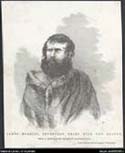Family Tales
We have not find any link to our family of this interesting man
James Murrells (Jemmy Morill)
He was born 1824 in Heybridge near Maldon, Essex, England
THE WORLD’S NEWS
SATURDAY OCTOBER 27, 1923

James Murrells, who was an honest English yeoman, born at Heybridge, near Maldon, in the county of Essex. His photograph, which is a very rare copy of the only one ever taken, shows him to be a good, honest, type of the old time sailor, with the circular style of beard of that period.
When he was brought down to Brisbane in 1863, he was, fortunately, interviewed by the late Edmund Gregory, who in after years was Government Printer of Queensland, and we have to thank Gregory’s manuscript for all the existing records of Murrells.
And Gregory expressed to me on several occasions his earnest regret for not making a special effort to exhaust Murrells’ store of rare and instructive knowledge, of which he admitted only touching the fringe. He spoke in high terms of Murrells’ modesty, and his kindly readiness to answer any questions.
And even Murrells’ partly told tale reads like a wild romance. After a few short voyages as a youth, on the English coast, he finally sailed as carpenter’s mate on board the Ramilies, which shipped the 11th Regiment of Foot for Hobart Town, and a detachment of Royal Artillery for Sydney, bound for New Zealand and the Maori War.
At Sydney he shipped on a small schooner called the Terror, and went across to New Zealand and back. Finally, on Tuesday, February 24, 1846, he shipped on board the barque Peruvian, bound for China, with a cargo of hardwood, and in charge of Captain George Pitkethley.
The Sydney Collector of Customs in 1863, W. A. Duncan wrote in reply to Mr. Edmund Gregory, giving the list of passengers on the Peruvian when she sailed out of Sydney Heads.
Besides the captain and his wife, there were a Mr. And Mrs. Wilmott, Mr. J. B. Quarry, and Miss Quarry, but Murrells told Gregory there also Captain Pitkethley’s brother as first mate, J. R. Quarry, and a six year old daughter, while Mrs. Wilmott had an infant and a nurse girl, the second mate, the carpenter, John Millar, the sailmaker, the cook, James Dicks, James Gooley, James Murrells, and two black men who had been stowaways, and were allowed to work their passage.
Finally she ran on a reef away east of Cape Cleveland, in the night, and remained there. Next day there was nothing around them but surf and rocks. The captain’s brother was washed away while trying to launch a boat, and was never seen again. The bread was all destroyed by the salt water, and the preserved provisions was overboard.
Then a raft was made, and 21 people drifted away on that at the mercy of wind and waves. Then Murrell’s narrative tells us: “The first death was James Quarry, leaving his child to survive him but a short time. He told us on the day before that he was dying. As soon as he died, he was stripped, and thrown over, the sharks devouring him instantly before our eyes. Mrs. Wilmott’s baby went next, then herself, and, one by one, they were thrown to the sharks.” They fished for sharks with a dead man’s leg for bait, caught one on a running bowline knot, on the end of an oar, chopped him up and ate him raw.
And so that dreadful journey, in which they and the sharks ate each other for 42 terrible days, and finally seven out of the original 21 landed three or four miles south of Cape Cleveland, and were all treated kindly by the wild blacks, with whom they stayed until only Murrells survived, and he remained until one day he walked up to the white men forming a new station on the Burdekin, in 1863, and was nearly shot before they saw he was a white man. He only lived until the 30th of October 1865, and died at Bowen, where he was a great favorite and the whole population went to his funeral. He had married a white woman, who bore him one son.
When leaving the blacks he relates that, “I told them I would probably be away for three or four moons, and they said ‘You will forget us altogether.’ When I said ‘Goondawyn,’ the man I was living with burst into tears, so did his wife, and several other men and women. It was a wild touching scene, and the remembrance of all their past kindnesses came up terribly strong, and quite overpowered me. There was a short, sharp struggle between a feeling of love for my old friends and companions and the desire once more to live civilized life.”
